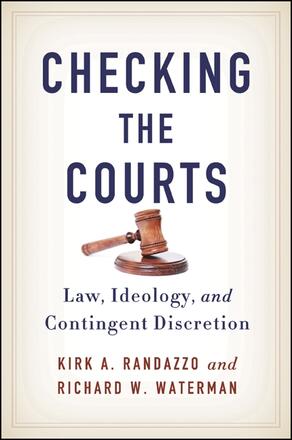
Checking the Courts
Law, Ideology, and Contingent Discretion
Alternative formats available from:
Examines and measures the extent to which statutory language affects judicial behavior.
Description
How does the language of legislative statutes affect judicial behavior? Scholars of the judiciary have rarely studied this question despite statutes being, theoretically, the primary opportunity for legislatures to ensure that those individuals who interpret the law will follow their preferences. In Checking the Courts, Kirk A. Randazzo and Richard W. Waterman offer a model that integrates ideological and legal factors through an empirical measure of statutory discretion. The model is tested across multiple judicial institutions, at both the federal and state levels, and reveals that judges are influenced by the levels of discretion afforded in the legislative statutes. In those cases where lawmakers have clear policy preferences, legislation encourages judges to strictly interpret the plain meaning of the law. Conversely, if policy preferences are unclear, legislation leaves open the possibility that judges will make decisions based on their own ideological policy preferences. Checking the Courts thus provides us with a better understanding of the dynamic interplay between law and ideology.
Kirk A. Randazzo is Associate Professor of Political Science at the University of South Carolina and author of Defenders of Liberty or Champions of Security? Federal Courts, the Hierarchy of Justice, and U. S. Foreign Policy, also published by SUNY Press. Richard W. Waterman is Professor of Political Science at the University of Kentucky and the author of several books, including The Changing American Presidency: New Perspectives on Presidential Power.
Reviews
"Checking the Courts presents a way of conceptualizing how both the expressed preferences of lawmakers and a judge's own ideology influence judicial behavior, an idea that will interest any student of the judiciary. " — Harvard Law Review
"…the authors deserve much credit for the extensive and unquestionably time-consuming research reported in this book. " — Criminal Law and Criminal Justice Books